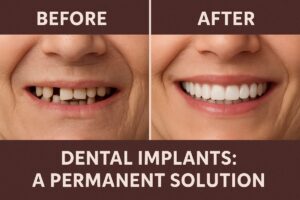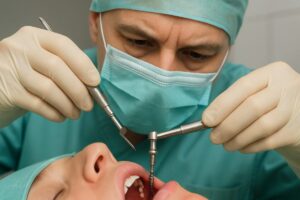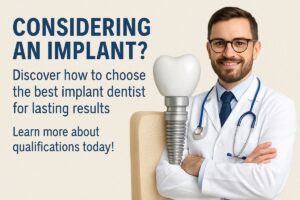Replacement of teeth means replacing one or more missing or failing teeth with a prosthetic solution. People need replacement to restore chewing, speech, and the look of their smile. This post compares common options — dental implants, bridges, removable dentures, and implant‑supported solutions — so you can choose the best replacement of teeth for your needs.
What is the replacement of teeth?
Replacement of teeth refers to any treatment that fills gaps left by missing teeth. Main methods include dental implants (individual titanium roots with crowns), fixed dental bridges (crowns anchored to nearby teeth), removable partial or full dentures, and implant‑supported dentures or All‑on‑4 systems for full arches.
Common options for replacement of teeth
Dental implants
A dental implant involves placing a titanium post into the jawbone, allowing it to heal and fuse (osseointegration), then attaching an abutment and crown. The process can take several months but often results in a natural look and strong chewing ability. Implants can last decades with good care.
Fixed dental bridges
A fixed bridge replaces a missing tooth by anchoring a false tooth to crowns on the adjacent teeth. Bridges are faster than implants and avoid surgery, but they require altering neighboring teeth and may need replacement after 8–15 years. Good for single or a few missing teeth when implants aren’t an option.
Removable partial and full dentures
Removable dentures are a non‑surgical, lower‑cost option. Partial dentures clip to remaining teeth; full dentures sit on the gums. Advantages include lower upfront cost and quick delivery. Downsides are less stable chewing, possible sore spots, and a need for periodic relines as the mouth changes.
All‑on‑4 and implant‑supported dentures
All‑on‑4 and similar implant‑supported dentures use several implants to anchor a full-arch prosthesis. These hybrid solutions offer more stability and better chewing than traditional dentures and can often be completed faster than placing many individual implants. They suit patients replacing a full arch who want strong function and better appearance.
Factors to consider when choosing a replacement of teeth
Oral health, bone and gum condition
Bone volume and gum health matter. Bone loss or active gum disease can limit implant options and may require grafts or periodontal treatment before replacement of teeth is possible.
Function and aesthetics goals
Decide how important strong chewing, speech, and a natural look are. Implants score highest for function and feel; bridges and implant‑supported options offer good aesthetics; dentures vary.
Budget, insurance and long‑term costs
Consider upfront cost vs long‑term value. Implants cost more initially but may be cheaper over a lifetime. Insurance often covers part of bridges or dentures but may limit implant coverage.
Treatment timeline and recovery
Implants take longer to finish and require healing time. Bridges and dentures are quicker. Recovery varies from minor soreness for bridges and dentures to several weeks for implant sites.
Preparing for treatment and what to expect
At your consultation expect an exam, X‑rays or CBCT, and a treatment plan. You may need extractions or bone grafts before replacement of teeth. Healing timelines vary; plan follow‑ups and temporary restorations when needed.
Risks, maintenance and long‑term care for replacement of teeth
Risks include implant failure, decay under bridges, and denture wear or poor fit. Daily care — brushing, flossing or special cleaning for dentures and implants — and regular dental checkups help protect your investment.
Finding the right provider for replacement of teeth
Look for dentists or specialists with experience in implants, bridges, and dentures. Ask about case counts, see before/after photos, and confirm financing options. A clear treatment plan and communication matter most. Book a consultation, bring past dental records or X‑rays, and ask about timelines, costs, and expected outcomes for your replacement of teeth. A careful exam will point you to the best option for your mouth and lifestyle.






